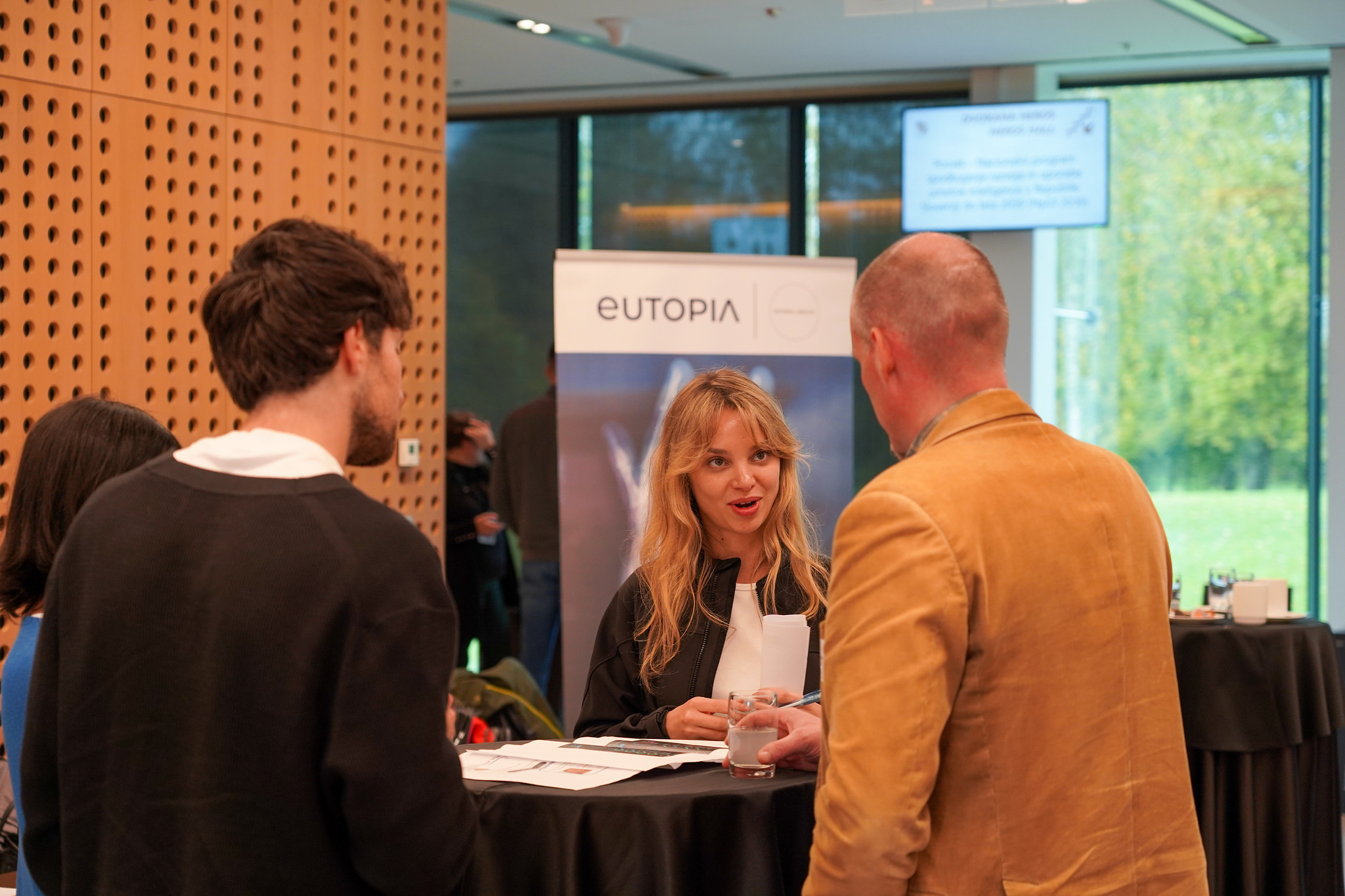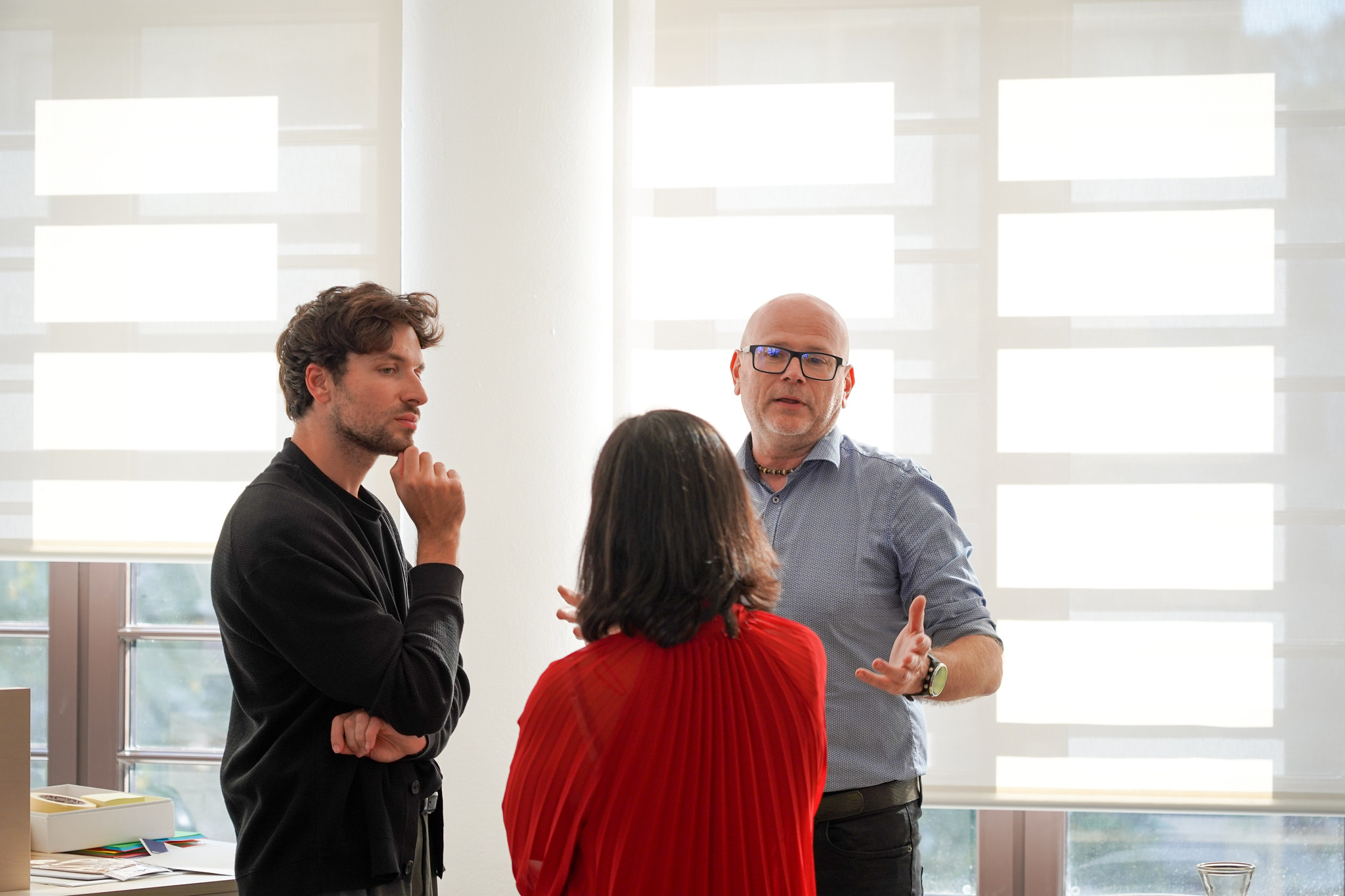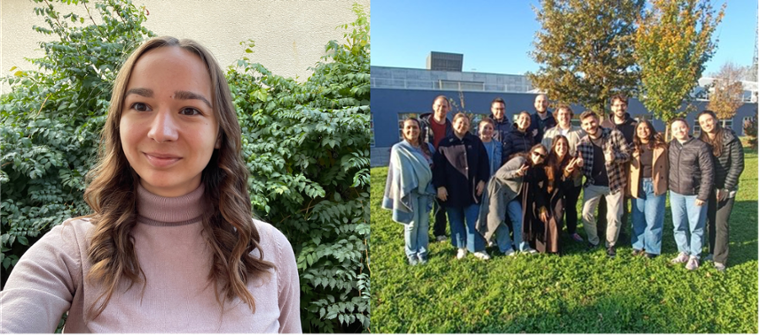© EUTOPIA / Nathan Lindstrom
In September 2025, Ljubljana became a hub of innovation as students, researchers, and mentors from across the EUTOPIA alliance gathered for the on-site phase of the EUTOPIA_HEALTH hackathon. Hosted by the University of Ljubljana and the Ljubljana University Incubator, the event challenged interdisciplinary teams to co-create solutions for real-world problems proposed by Roche Slovenia and food-tech company Juicy Marbles.
The hackathon built on a June online kickoff and months of summer preparation. What awaited participants on site was three intensive days of design, prototyping, and pitching — a fast-paced journey from challenge to solution.
Day 1: From a Challenge to an Idea
The hackathon opened on September 15 at Center Rog with morning coffee and networking, before diving straight into a lecture on the Design Thinking methodology. The session introduced participants to the principles of empathise and define, and offered practical advice on how to conduct user interviews to uncover genuine needs.
The challenges were then formally presented: Roche’s call to make preventive healthcare more visible and motivating, and Juicy Marbles’ question of how to design the food of the future in a way that balances health, sustainability, and joy. With these problems in mind, participants launched into brainstorming, generating ideas, and forming cross-disciplinary teams.
Ieva Stončikaitė a postdoctoral researcher from Pompeu Fabra University-Barcelona said:
"We’re having a lot of interesting interactions and, at the same time, a lot of fun. The interdisciplinary mix makes it challenging, but it’s also what makes it so rewarding."
The afternoon took them into the field. Around the Rog Center, teams interviewed potential users, gathering perspectives to ground their concepts in real-world experience. Back in the classroom, they began turning raw ideas into initial concepts, sketching product and service solutions.
© EUTOPIA / Nathan Lindstrom
Day 2: From an Idea to a Prototype
The second day shifted focus from concepts to prototypes. A morning lecture introduced practical methods for prototyping and testing. Teams then refined their ideas, conducting additional desk research and creating early prototypes ranging from mock-ups to surveys and promotional materials.
© EUTOPIA / Nathan Lindstrom
In the afternoon, participants took their work outside the classroom, joining the Slovenian Chamber of Commerce’s Innovation Day in Brdo pri Kranju. There, they tested their prototypes with real users, gathering immediate feedback to validate and challenge their assumptions. This direct interaction with the public added energy and urgency to the process, pushing teams to iterate quickly and strengthen their solutions.

© EUTOPIA / Nathan Lindstrom
Day 3: From a Prototype to a Pitch
The final day began with a short lecture on how to deliver an effective pitch. Teams then had the morning to polish their presentations, with mentors offering targeted feedback on clarity, impact, and feasibility.
After lunch, the hackathon culminated in the final pitching session. Each team presented its solution to an expert panel of industry and innovation professionals, outlining not only what they had created but also how it could make a real difference. Proposals included new digital tools to promote preventive healthcare and creative food innovations designed to meet the demands of transparency and sustainability while keeping joy at the centre of eating.

© EUTOPIA / Nathan Lindstrom
Collaboration and Impact
The EUTOPIA_HEALTH hackathon demonstrated how collaborative innovation can bridge the gap between research and real-world application. By combining academic knowledge, industry challenges, and user input, participants created solutions with clear potential for impact.
Just as importantly, they gained skills and experiences, from user-centered design and prototyping to pitching and teamwork, that will serve them in their future careers. For many, the greatest takeaway was the chance to work across disciplines and borders, tackling shared challenges in health and nutrition together.
Sara Baptista, who works at the Technology Transfer Office at NOVA University Lisbon stated:
"It was a wonderful experience — three intense days where you’re pushed to think fast, innovate, and connect. What stood out most was meeting people from across EUTOPIA and working directly with companies like Roche and Juicy Marbles. That contact with the industrial ecosystem is invaluable."
Pavle Simić, a Researcher at the Biotechnical Faculty at the University of Ljubljana, said:
"The hackathon really exceeded my expectations. The overall organisation was excellent, and we learned so much from the way we used interviews and feedback to shape our innovation. This experience really gave me more confidence to take on new challenges. The most exciting part for me has been the teamwork. We all come from different backgrounds, and when you combine those perspectives, the result is stronger — a better product, a better idea. ”
Postdoctoral researcher Ieva Stončikaitė from Pompeu Fabra University-Barcelona expressed:
"Working with people from different countries and fields gives you a more holistic perspective. You don’t just see things from your own discipline anymore — you see new angles and approaches you wouldn’t have considered."
Lecturer Nicoleta Ignat, from Babeș-Bolyai University in Romania said:
"It’s not just about this one event. The connections and knowledge we’ve built will continue long after we leave Ljubljana!"
Article by Nathan Lindstrom

